US Seeking Ways To Further Target Iranian Drone Production
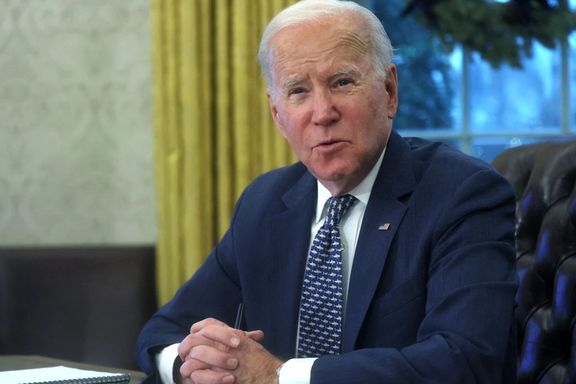
The United States is looking at ways to target Iranian drone production through sanctions and export controls, the White House said on Wednesday.

The United States is looking at ways to target Iranian drone production through sanctions and export controls, the White House said on Wednesday.
White House National Security Council spokesperson Adrienne Watson said in a statement Wednesday that Washington is talking to private companies whose parts have been used in production of the drones.
"We are assessing further steps we can take in terms of export controls to restrict Iran’s access to technologies used in drones," read the statement.
According to a Ukrainian intelligence assessment obtained exclusively by CNN, parts made by more than a dozen US and Western companies were found inside a single Iranian drone downed in Ukraine last fall.
The United States has previously imposed sanctions on companies and people it accused of producing or transferring Iranian drones that Russia has used to attack civilian infrastructure in Ukraine.
The Islamic Republic claimed Monday that Ukraine has never submitted any proof of Iranian-made drones being used by Russia in the war, as Russia launched another large attack.
Ukraine said December 13 that it provided Iran with the evidence. "We are not surprised by yet another objection from Iran regarding the supply of weapons to Russia. During the technical meeting, Ukrainian experts provided the Iranians with the sufficient evidence," Foreign Ministry spokesman Oleg Nikolenko said during an interview with Kyiv-based news agency Interfax-Ukraine.
Iran’s decision to supply weapons to Russia has played a major role in the deterioration of its already frayed ties with Europe that has put nuclear talks with Tehran on the back-burner since evidence emerged of the kamikaze drones being launched by Russia in October.

An Iranian regime insider says Iran’s military presence in Syria for many years was directly ordered by Supreme Leader Ali Khamenei.
Ali Shirazi, the former representative of Khamenei in IRGC's Quds Force said Wednesday that “when the Supreme Leader ordered former Quds Force commander Qassem Soleimani to go to Syria, he did not argue. He went and resisted firmly.”
“However, [other] officials including then-President Mahmoud Ahmadinejad did not believe we should go to Syria and fight against ISIS,” he added.
Shirazi’s comments about fighting ISIS contradict the fact that when Iran intervened in the Syrian civil war in 2011 the Islamic State group did not exist yet. Iran sent thousands of fighters and weapons to defend the government of Bashar al-Assad.
ISIS gained a foothold in Syria after the group seized large swaths of territory in Iraq in mid-2014.
Soleimani intervened in Syria as opposition to Assad was gaining momentum. He first played the role of an advisor to the government, but later he spearheaded Iran’s large-scale military intervention in the civil war. Many believe he was responsible for the deaths of thousands of civilians and call him the child-killing commander.
Soleimani was killed in Baghdad along with nine others in 2020 by a drone strike ordered by then-President Donald Trump.
The Qods Force under Soleimani became deeply involved in the conflicts in Syria and Iraq. Trump claimed that the general, who was Iran’s main operative in the Middle East, was killed because he was planning attacks on US troops.
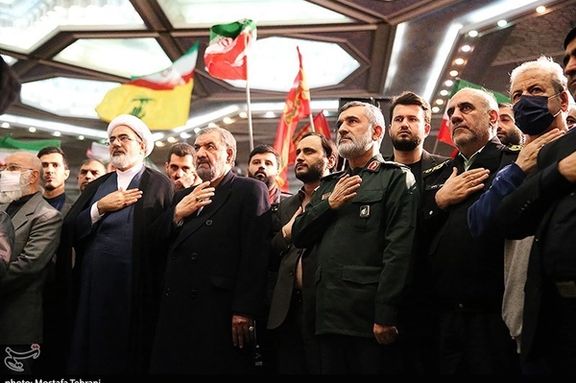
The Iranian Foreign Ministry says the US killing Qassem Soleimani. former commander of IRGC's Quds Force in 2020 failed in bringing Washington its desired outcome.
In a tweet on Tuesday, the foreign ministry claimed Iran continues “to play a decisive role” in the region and the United States’ “footprint in West Asia continues to diminish”.
The tweet was published on the eve of the third anniversary of Soleimani’s killing by the United States.
On January 3, 2020, the US military, on the order of President Donald Trump, killed Soleimani in a drone strike near Baghdad International Airport, saying that he had been "actively developing plans to attack American diplomats and service members in Iraq and throughout the region."
In a Monday statement, the Iranian regime also claimed that Washington conducted the killing of Soleimani with "false claims and pretexts, including under the guise of counter-terrorism" and in "naked violation of the tenets and principles of international law."
Iranian Foreign Minister Hossein Amir-Abdollahian said on Sunday that nearly 60 US officials have been blacklisted by Tehran for their involvement in the assassination of Soleimani.
Iran’s President Ebrahim Raisi and Supreme Leader Ali Khamenei have time and again vowed revenge for the killing of Soleimani.
Raisi in a speech on Tuesday addressed the US saying, “We have not forgotten martyr Soleimani’s blood and will never forget. They [Americans] should know that revenge for Soleimani is certain and his killers…will not have any peaceful sleep.”
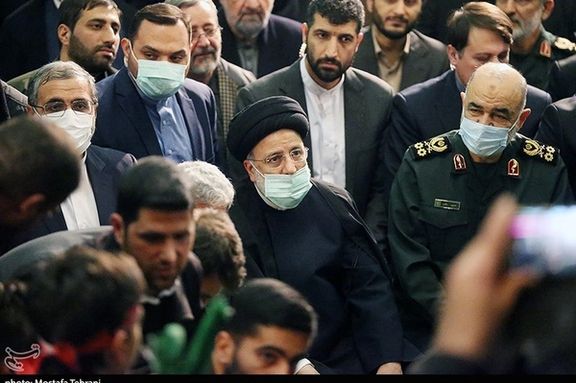
At the same time, many Iranian regime opponents and activists on social media celebrated Soleimani’s killing anniversary, calling it a “Cutlet Day”, after a popular Iranian dish made of ground beef and potatoes. Soleimani’s body was so mutilated in the attack that his detractors came up with the comparison to the meat and potato patties.
Some activists said that if Soleimani was alive he would have ordered a more brutal response to the current protests and would have had no reservations about killing thousands of people. They accused him of playing such a role in past protests and engineering Iran’s bloody military intervention in Syria against anti-Assad rebels, when hundreds of thousands of people were killed, injured and left homeless.
Protesters in Iran burned many banners erected in Soleimani’s honor this week and set fire to several of his statues.
A member of Iranian Revolutionary Guard was charged in August with planning to assassinate John Bolton, the former United States National Security Advisor in what the US Justice Department called “retaliation for the death of Iran’s Islamic Qasem Soleimani”.
Former Secretary of State Mike Pompeo was also told by the Justice Department that he was a second target of the plot.
Soleimani, who was Iran’s top military and intelligence operator outside its borders, was in charge of supporting and organizing militant proxy forces, including the Lebanese Hezbollah and Iraqi Shiite militia groups that have repeatedly attacked US forces.
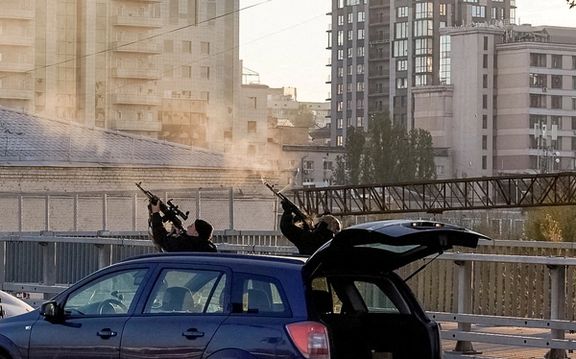
Ukrainian President Volodymyr Zelenskyy says Russia is planning prolonged attacks on the Ukrainian territory using Iranian Shahed kamikaze drones.
"We have information that Russia is planning a prolonged attack with 'Shaheds.' Its bet may be on exhaustion. On exhaustion of our people, our air defense, our energy sector... Now is the time when everyone involved in the protection of the sky should be especially attentive," Zelenskyy said in a video message Monday evening.
He asked everyone to brace themselves "to do everything so that this goal of the terrorists fails, like all the others."
According to the official statement by Ukrainian government, over 80 Iranian drones have been shot down by the country’s air defenses just in the past few days, and the number could increase in the coming weeks.
Since early October, the energy infrastructureacross Ukraine has been attacked repeatedly by Russian missiles and drones, resulting in dozens of casualties and disruption in water and power supplies.
Iran has denied supplying weapons to Russia for its war in Ukraine, but foreign minister Hossein Amir-Abdollahian after earlier denials acknowledged in early November that Tehran had supplied drones to Moscow “months before” the Ukraine war, leaving it vague if these were used in the war.
The United States and its European allies have strongly objected to Iranian drones for Russia, imposing sanctions move, and keeping nuclear talks with Tehran dormant.
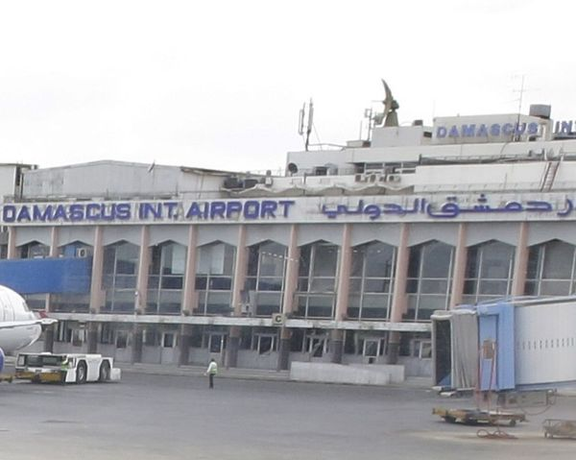
Israeli air strikes targeting Iran-linked assets in Syria have been concentrating on airports as the Islamic Republic is trying to step up its presence while Russia is focusing on Ukraine.
The Syrian army said on Monday that a volley of air-launched missiles, coming from the direction of Lake Tiberias in Israel, hit the Damascus International Airport at 2 am local time and briefly put the airport out of service.
Missiles also hit targets in the south of Damascus, killing two members of the Syrian armed forces and causing some damage, the army said. Earlier, two regional intelligence sources said the strikes had hit an outpost near the airport of the Revolutionary Guard’s Quds Force -- a division primarily responsible for extraterritorial military and clandestine operations – and its affiliated militias.
Last year, Israel intensified strikes on Damascus International and other civilian airports to disrupt Tehran's increasing use of aerial supply lines to deliver arms to allies in Syria and Lebanon, including Hezbollah. Syria halted flights to and from the airport in June for nearly two weeks after Israeli strikes caused extensive damage to infrastructure.
Since late in November, Syria and Iran have been deploying new air defense systems, including jamming and early warning systems, around Damascus to prevent Israeli airstrikes in the area. There are reports that the new systems were built by Korean and Chinese companies and provided by Iran as part of agreements reached between Damascus and Tehran.
On Monday, Iran's foreign ministry spokesman Nasser Kanaani decried the Israeli attack on Damascus airport, calling on the global community to condemn the violation of Syrian territorial integrity. “We were informed that the Damascus airport was hit by the Zionist regime; this action is condemned in our opinion and the United Nations and other institutions should condemn these aggressions,” he said.
Last week, a report by Asharq Al-Awsat said Iran is seeking to revive the expansion of its presence near Damascus, something it has always sought to do but was previously prevented by Russia. According to the report, the Islamic Republic’s objective is to create another “southern suburb”, commonly known as Dahieh, like the Hezbollah-dominated suburb of the Lebanese capital Beirut.
Now the landscape has changed as Russia seems to be needing its forces for the invasion of Ukraine, so it is evacuating the region with coordination of the Islamic Republic, which is supplying Moscow with drones and missiles to be used in against the Ukrainians.
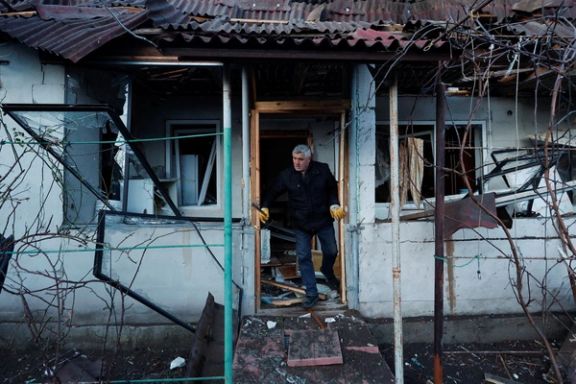
Also on Monday, a salvo of Iranian-made Russian drones targeted infrastructure in Ukraine's capital and surrounding areas, damaging energy facilities and causing some power outages, officials said.
Ukraine’s air force said that its air defense systems destroyed all of Russia's 39 Iranian-made Shahed drones that targeted Ukraine overnight in what it said was a “massive attack”.
"Russians launched several waves of Shahed drones. Targeting critical infrastructure facilities. Air defense is at work," Kyiv Governor Oleksiy Kuleba said.
Kyiv Mayor Vitali Klitschko said 40 drones “headed for Kyiv” overnight. Klitschko said 22 drones were destroyed over Kyiv, three in the outlying Kyiv region and 15 over neighboring provinces.
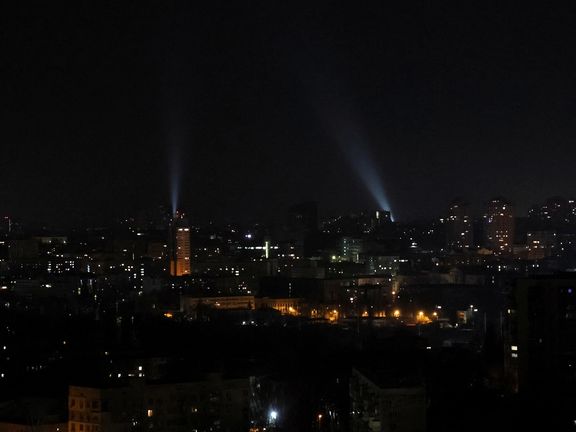
Iran claimed Monday that Ukraine has never submitted any proof of Iranian-made drones being used by Russia in the war, as Russia launched another large attack.
Ukraine said waves of Iranian-made Russian drones targeted infrastructure in Kyiv and surrounding areas on Monday, damaging energy facilities and causing some power outages, officials said, as Russia extended its bombardment into the second day of 2023.
Ukraine’s air force said that its air defense systems destroyed all of Russia's 39 Iranian-made Shahed 131 and 136 drones that targeted Ukraine overnight in what it said was a “massive attack”.
Iran’s foreign ministry spokesman Nasser Kanaani in his weekly briefing implicitly denied the use of Iranian-made drones and said Kyiv has never produced any evidence.
Ukraine said December 13 that it provided Iran with the evidence. "We are not surprised by yet another objection from Iran regarding the supply of weapons to Russia. During the technical meeting, Ukrainian experts provided the Iranians with the sufficient evidence," Foreign Ministry spokesman Oleg Nikolenko said during an interview with Kyiv-based news agency Interfax-Ukraine.
Iran’s decision to supply weapons to Russia has played a major role in the deterioration of its already frayed ties with Europe that has put nuclear talks with Tehran on the back-burner since evidence emerged of the kamikaze drones being launched by Russia in October.
Kanaani also spoke about these talks, having little to offer as a sign of any positive movement. After 18 months of negotiations to revive the 2015 nuclear accord known as the JCPOA the talks broke down in early September. The United States has said i tis not focused on the diplomatic effort any more because Iran presented last-minute extraneous demands.
Meanwhile, nationwide antigovernment protests in Iran have posed the most serious challenge to the Islamic Republic in its 43year history, with the economy in serious trouble. Consequently, Tehran has been showing renewed interest in reviving the nuclear talks, because the process, if successful, could end harsh US sanctions and bring a much-needed financial relief to the embattled regime.
Kanaani insisted that Iran is ready to conclude the nuclear talks based on a draft agreement prepared "after months of difficult talks," referring to what the European Union submitted in August to all sides to wrap up the negotiations. It was at this juncture when Tehran and Washington were giving their feedback to the draft that talks came to a standstill.
Kanaani also tried to put a positive spin on chances of improving relations with Saudi Arabia and Egypt, amid its regional isolation. Iran was not even invited to tripartite defense talks between Russia, Turkey and Syria last week, although it is a major player in the Syrian conflict. It has also not been invited to a similar meeting of foreign minsters to take place in the second half of January.
Asked about why Iran has not been invited, Kanaani simply replied that "Russia, Turkey and Syria are well aware of Iran’s decisive role in the fight against terrorism in Syria and its support for the people and the government [of Syria]".